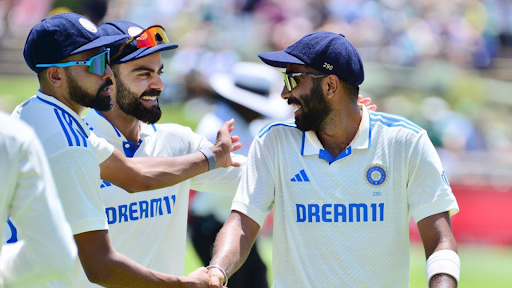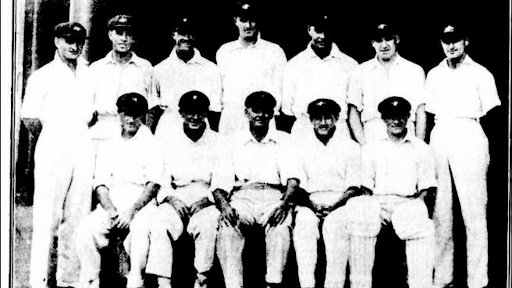Top 5 Shortest Test Matches with a result in least deliveries bowledTop 5 Shortest Test Matches with a result in least deliveries bowled

In the fascinating realm of Test cricket, where the red ball reigns for five days, the beauty lies in its unpredictability. Matches can culminate in riveting draws or, as witnessed recently, deliver swift results in a mere two days.
Remarkably, the New Year Test at Newlands in Cape Town, featuring hosts South Africa and India, defied expectations by concluding in a brisk two days—spanning a mere five sessions breaking a 92-year record for the shortest Test match, etching the match into the 146-year history of cricket as the shortest-ever Test, characterized by the fewest deliveries bowled.
Now, let’s delve into the archives to explore the top 5 instances where Test matches concluded with the fewest deliveries bowled, showcasing the unpredictability that makes Test cricket a captivating spectacle.
#5 792 Balls: Eng vs Aus (Lord’s, 1888)
The first Ashes match of 1888 between England and Australia, unfolded at the historic Lord’s Cricket Ground in the 19th Century and concluded with just 792 balls (198 overs) being bowled. During this era in England, an over comprised four balls instead of the contemporary six.
Australia, having won the toss, chose to bat but could only muster 116 runs in 71.2 overs. By the end of Day 1, England found themselves at 18-3. The second day witnessed extraordinary events as England crumbled to an all-out total of 53 runs in just 50 overs.
Despite holding a first-innings lead of 63 runs, Australia could only add 60 more runs before being dismissed in 29.2 overs, setting a target of 124 runs for the hosts. In the fourth innings, England faltered in their pursuit, collapsing from 29-0 to a mere 62 all out. This match still holds the world record for the most wickets fallen in a single day’s Test cricket, with a staggering 27 wickets on Day 2.
Australian pacer Charlie Turner emerged as the standout performer, claiming fifers in both innings and playing a pivotal role in securing Australia’s victory by 61 runs.
#4 788 Balls: Eng vs Aus (Manchester, 1888)
Approximately 45 days after the Lord’s Test, the pivotal Manchester Test of the 1888 Ashes series transpired between England and Australia. The series decider became even more crucial due to intense rainfall before the game, resulting in a damp pitch that favored the team batting first.
England displayed resilience, facing 113.1 overs on Day 1 but managed only 172 runs in their first innings. Meanwhile, Australia concluded Day 1 at 32/2. The scorching sun on the following day transformed the pitch into a challenging “sticky” wicket, leading to Australia being bowled out in under 53 overs, scoring just 81.
Forced to follow on, Australia faced another setback on Day 2 as England remarkably dismissed them for 70 runs in 31.1 overs before lunch, sealing the victory by an innings and 21 runs.
The entire match spanned 788 deliveries (197 overs), witnessing 18 wickets falling before lunch. Notably, England’s left-arm orthodox bowler, Bobby Peel, played a pivotal role, claiming 11 wickets in the match.
#3 672 Balls: WI vs Eng (Bridgetown, 1935)
In the intriguing 1935 England tour to the Caribbean Islands, a captivating moment unfolded during the Barbados Test, characterized by both teams declaring their innings before reaching the 100-run mark – a not so rare occurrence in an era where pitches remained uncovered, even amidst heavy rain.
Opting to field first, England restricted the hosts to a modest 102 runs in 47 overs on Day 1 but found themselves in a precarious position at 81 for 5 by stumps. Day 2 witnessed a bold move from England as, with three wickets in hand, they declared their innings early after losing two quick wickets without adding to their overnight score.
Day 3 witnessed an even bolder move from the hosts, who, after playing just 19 overs, declared their innings at 51 runs for the loss of 6 wickets setting a fourth-innings target of only 73 runs. England successfully chased it down in 16.3 overs, losing 6 wickets in the process. Despite the match concluding on Day 3, the entire contest saw only 672 balls (112 overs) bowled.
#2 656 Balls: Aus vs SA (Melbourne, 1932)

The Kangaroos and the Proteas scored an aggregate of 234 runs: A record that still stands!
In a dead rubber encounter between Australia and South Africa at the MCG, the match unfolded over four days, though only Day 1 and Day 4 saw actual gameplay. Despite Proteas choosing to bat after winning the toss, Australia’s formidable bowling attack dismissed them on 36 runs in a mere 23.2 overs.
Responding with resilience, Australia posted 153 runs in 54.3 overs before being all out. The suspense lingered as Day 2 succumbed to rain, and Day 3 served as a rest day.
As the contest resumed on Day 4, Australia’s bowlers, led by Bert Ironmonger, exhibited brilliance, bundling out the Proteas for a mere 45 runs in 31.3 overs. The hosts claimed victory by an innings and 72 runs, setting a record for the second-shortest test match in terms of balls bowled, with a total of 656 balls (109.2 overs).
#1 656 Balls: SA vs Ind (Cape Town, 2024)
A total of 656 balls in a modern-day test match ending in a result is an unthinkable feat achieved by the bowling attacks of two teams while several questions have been raised about the pitch in question since the match ended early on Thursday.
After losing the Boxing Day Test, India bounced back in the New Year Test held at Newlands, Cape Town and the Indian bowlers displayed an efficient bowling attack with Mohammed Siraj scalping 6 wickets for 15 runs while Mukesh Kumar took two wickets without giving away a run on his debut dismissing the Proteas inside 23.2 overs.
Rohit Sharma, Shubman Gill, and Virat Kohli ensured India reached 153/4 inside 33 overs but the next 11 balls gifted the hosts six wickets without a run scored and the Indian innings was packed in less than 35 overs.
Aiden Markram led the South African batting as he scored a marvellous century on an unplayable pitch which got a bit better on the morning of Day 2 as South Africa posted 176 in 36.5 overs. India benefitted from the same as the visitors chased down the target of 79 runs within 12 overs.

